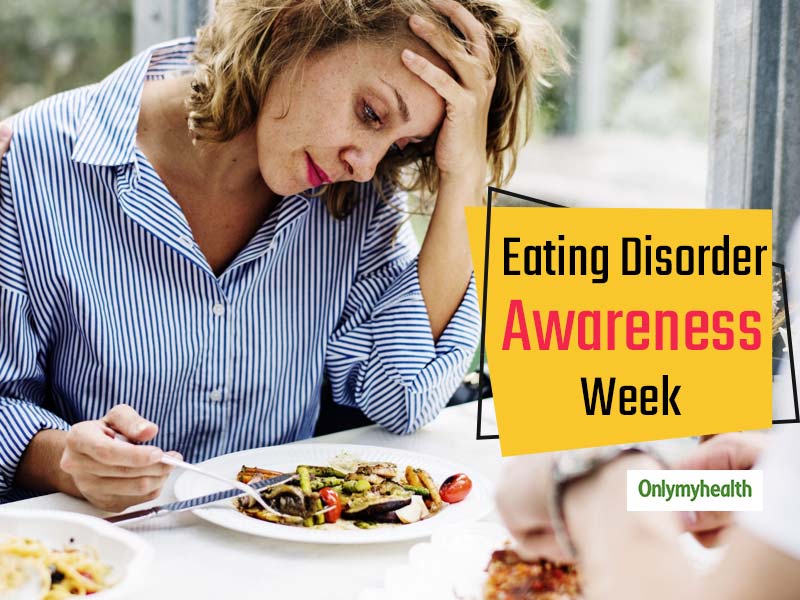
Eating Disorders Awareness And Screening Week 2020: Eating disorders are a range of serious unhealthy eating habits that negatively impact an individual physically and mentally. Eating disorders involve focusing on too much on food, body weight and body shape leading to unhealthy eating habits affecting the body’s health due to inadequate and inappropriate nutrition leading to heart-related diseases, also it can affect the digestive system, bones, skin, teeth and mouth leading to other problems. These disorders can develop due to the pressure of peers or society to have a size zero figure, cultural preference for being thin and the media promoting such ideology.
Table of Content:-
Different types of eating disorders
Anorexia Nervosa
- Anorexia Nervosa is an eating disorder characterized by excessive starvation and the fear of gain weight. This disorder is more common in females than in males. Individuals with this disorder tend to avoid food by starving and even may go to the extent of vomiting and even using a laxative.
- Symptoms include rapid weight loss, fear of gaining weight, no interest in food, compulsive exercise, feeling overweight despite being underweight, social withdrawal, depression, anxiety and irritability.

- Anorexia can have major consequences in health such as damaged organs (heart, brain), loss of hair, drop of blood pressure, fluid-electrolyte imbalance or even worse such as from starvation or suicide.
- Anorexia can be treated with psychotherapy by making the individual understand that it is not necessary to look thin or to compete with the society, counselling sessions and nutrition therapy in which the individual should be counselled for maintaining the ideal body weight as per the individuals age, gender and height and giving tips to maintain a healthy weight. Nutrition counselling also involves making the individual realize the healthy approach towards food and weight also the need of following a balanced diet and the importance of adequate nutrition.
How To Deal With A Child Who Has An Eating Disorder?
Bulimia Nervosa
- Bulimia Nervosa is characterized by overeating followed by the excessive method of avoiding gaining weight such as vomiting, using laxatives and excessive exercise.
- Symptoms include lack of control overeating. Eating extensively large amounts of food, secretly eating, going to the bathroom after eating, using a laxative, diuretics after eating, exertive exercise after eating, depression or mood swings, irregular periods, weakness, exhaustion and also higher risk for suicidal behaviour.

- Bulimia needs to be treated by taking into consideration of the physical and psychological needs of the individual. Counselling by a psychologist is necessary. Involvement of doctors and nutritionist is also required. A nutritionist will play an important role in helping the individual in restoring himself or herself nutritionally and find a healthy way to approach food and adopt a healthy lifestyle by following a well- balanced diet as per the requirement of the body.
Other eating disorders include
Also Read: Side-Effects Of Eating Too Many Dates
Binge Eating Disorder

- Binge eating disorder is characterized by typically eating large amounts of food in short periods of time and the feel of lack of control.
- Causes of binge eating can be body size and shape, emotional trauma, stress, psychological conditions.
Rumination Disorder

Rumination disorder is characterized by a condition in which a person regurgitates food they have previously chewed and swallowed and re-chews it and then re-swallows it or spits it.
Also Read: Vitamin F and Its Importance For Your Healthy Living
Avoidant / restrictive food intake disorder
Avoidant/restrictive food intake disorder is characterized by individuals having disturbed eating due to lack of interest or due to the smell, colour, taste or appearance of food.

It is important to create awareness among individuals about the need to have a balanced diet and a well-balanced approach in terms of food and exercise. There should also be restrictions and discouragement of the practically impossible and unrealistic approach of body types.
(Ideas contributed by Zoya Fakhi, Nutritionist, Bhatia Hospital, Mumbai)
Read more in Other Diseases
Read Next
Concussion Care: Know Everything About Head Injury Management, Do's And Don'ts For First Aid
How we keep this article up to date:
We work with experts and keep a close eye on the latest in health and wellness. Whenever there is a new research or helpful information, we update our articles with accurate and useful advice.
Current Version